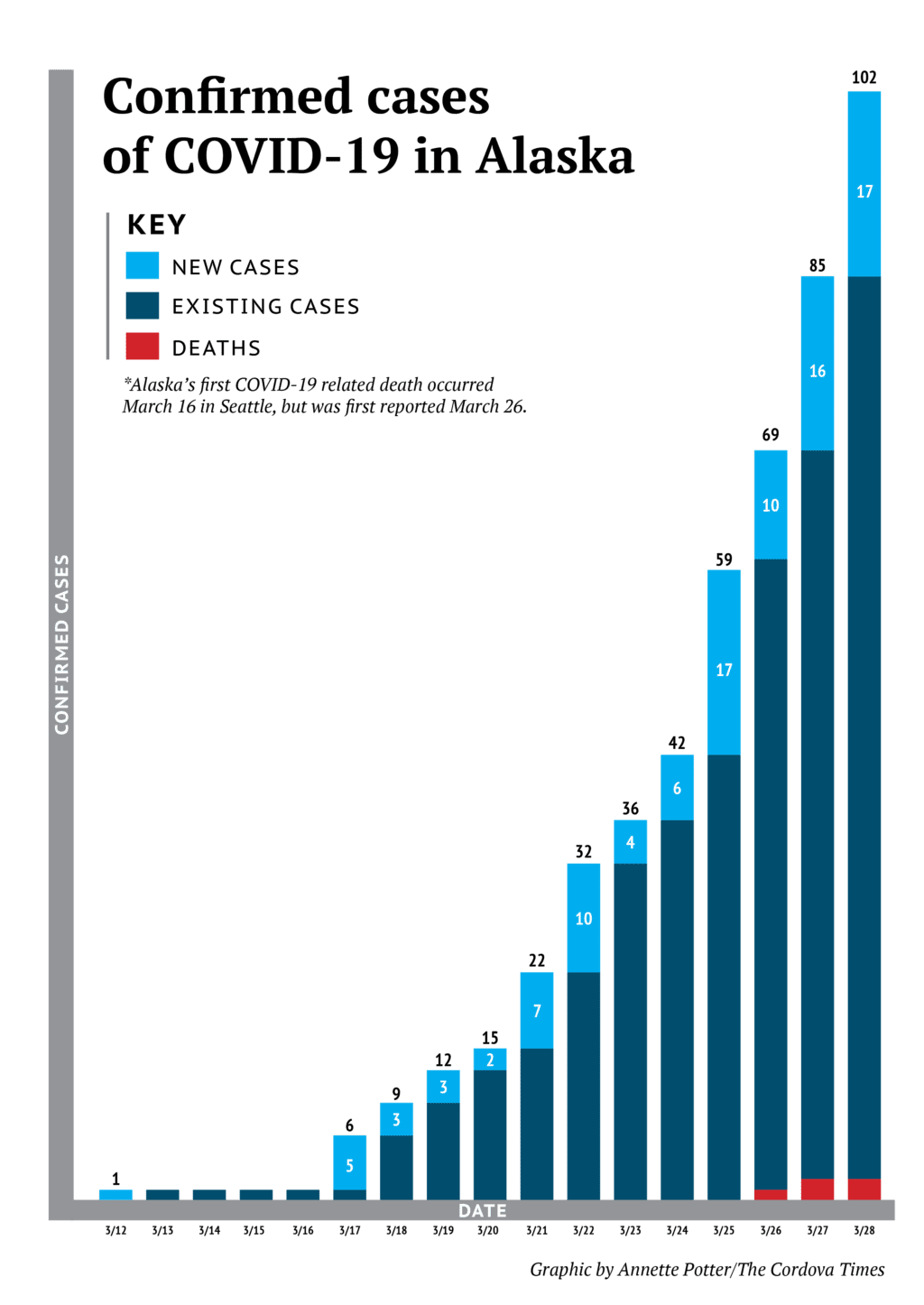Alaska had 102 confirmed cases of novel coronavirus as of Saturday, March 28, a boost of 17 over a day earlier.
Among them is a resident of a long-term care facility in Fairbanks.
State epidemiologist Dr. Joe McLaughlin said that the facility owned by Foundation Health Partners was working to mitigate the spread of COVID-19.
“They are working closely with our epidemiologists to determine which residents and staff are at highest risk for exposure and implementing control measures that are consistent with national guidelines,” he said.
Lee is leading a tactical group focused on protecting the state’s long-term facilities, as well as older adults and those with underlying health conditions who are at greater risk for severe illness from COVID-19.

Newly diagnosed cases include Anchorage 10, Fairbanks 3, and one each in Eagle River, North Pole, Homer and Soldotna, all communities where other cases already existed.
Those cases brought the statewide total to Anchorage and Joint Base Elmendorf Richardson 49, Fairbanks 16, Ketchikan 12, North Pole 7, Juneau 4, Eagle River/Chugiak 4, Homer, 2 Palmer 2, Sterling 2, and Girdwood and Seward 1 each.
Six are hospitalized, including one individual added during the most recent 24-hour period, state health officials said.
The death toll of Alaskans from COVID-19 currently stands at one person who was being treated for an underlying illness at the Alaska Native Medical Center and a Petersburg resident who died in Washington state, where he was being treated for other medical issues.
Ten of the new cases are under investigation. Two of those new cases are known to be travel-related and five are close contacts of previously diagnosed individuals. Five of the patients are over the age of 60, nine are adults ages 30-59, two are 19-29 and one is a child. Seven are male and 10 are female.
State and local government officials are admonishing all Alaskans to wash hands frequently, keeping hands off of the face, keep a minimal six feet of space between themselves and others who are not immediate family and wipe down all frequently touched surfaces.
Also, in effect are statewide mandates for everyone entering Alaska, including residents coming home, to quarantine themselves for 14 days at home. Those battling respiratory infections, even with mild symptoms, are asked to isolate themselves from others and to call ahead if they need medical attention.
A growing number of rural communities, including Cordova, have also imposed their own requirement for everyone entering their community to self-isolate for 14 days.
On Thursday, March 26, the city of Saint Paul, in the Pribilof Islands, adopted a resolution banning all non-essential travel to the island through April 15. Fisheries-related businesses with state approved pandemic response plans are considered essential businesses and exempted.
Alaska Airlines announced plans to reduce its flight schedule for April and May by 70 percent following historic and unprecedented falloff in demand because of the pandemic.
Airline officials said flight schedules for June and beyond will be based on demand, but they expect reductions will be substantial for at least the next several months.
RavnAir confirmed on Friday, March 27, that the carrier denied seats on a RavnAir flight headed for Bethel to two infants with suspected respiratory syncytial virus, or RSV, a common respiratory infection among infants and toddlers in that region of Alaska.
RavnAir implemented a verbal and visual screening program on March 16 for all passengers and employees to ensure the health of everyone on its planes, the company said.
RavnAir said the company considered that effort successful “as we have prevented nearly 40 passengers who were either at risk or showing signs of illness from flying on our planes and putting others in harm’s way.”
Under their screening plan any passenger presenting symptoms associated with COVID-19 who does not have a doctor’s note is not allowed to fly on their planes.
RavnAir said that the Yukon-Kuskokwim Health Corp. was notified that if they were willing to conduct an assessment via telemedicine and provide possible RSV patients or their parents/guardians with a doctor’s note explaining that the physician believed the passenger had RSV and not COVID-19 then the patient would be allowed to fly on RavnAir, as long as the patient had a mask on and did not fly on a normally scheduled flight with other passengers.
One of the new state government mandates announced on March 27 dictated that only those engaged in essential health care services, public government services and essential business activities are exempt from remaining at their place of residence and practicing social distancing.
The second mandate dictates that all instate travel between communities, whether resident, worker or visitor, is prohibited unless travel is to support critical infrastructure or for critical personal needs.
Alaska legislators and federal officials were also working to provide financial aid to a multitude of people who found themselves suddenly out of work.
The pandemic’s impact on the economy and life overall in Alaska has been dramatic, the saving grace being that Alaska has huge areas where people can recreate while maintaining a great deal of distance between themselves and others while walking, hiking, ice skating, skiing and engaging in other outdoor activities.
A number of businesses and other entities, from nonprofit entities to religious congregations, were restricting entry to or have closed their facilities, leaving them facing their regular rent space and utility bills with little or no income.
Gyms are closed. Many restaurants, coffee shops and other retail establishments are offering take-out or curb service only. Many companies that were counting on another lucrative summer tourism season are now telling workers hired for the season to stay home. Other businesses, including hair salons, where there is close interaction with customers, have been ordered closed. Many people employed in service industry jobs are now without jobs at least on a temporary basis.





